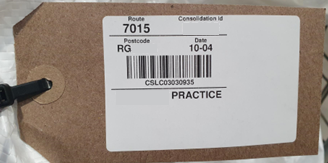Doncaster heart failure pilot
Powered By EmbedPress
Changes to antibiotic susceptibility reporting on ICE by DBTHFT
Powered By EmbedPress
Changes to antibiotic susceptibility reporting on ICE by DBTHFT
Powered By EmbedPress
PCSE GP Practice webinar update
PCSE hosted its most recent webinar – ‘Managing GPs in PCSE Online’ – on 27 March, covering user management, and Performer List and Pensions processes.
Based on the questions asked during the session and other feedback, PCSE has updated resources so that GP Practices can find information more easily.
PCSE have updated the GP practice web pages on their website, and have created a dedicated playlist on YouTube for GP practices.
| Click here to go to the website. | |
| Click here to view the Youtube playlist. |
Medical records deliveries
When GP practices receive medical records deliveries, all sacks will have a sealed tag with the following information:
|  |
You should ensure that all details are correct before breaking the seal to ensure that you have received the correct records meant for your practice.
Please check you have received the correct delivery while the courier is still there if possible. If an incorrect delivery is identified after the courier has left, please contact our the PCSE Customer Support Centre who will raise a case.
BMA Wellbeing resources
The BMA continue to encourage practices to focus on their own team’s wellbeing and take time to reflect on what can be done to protect it (this will also meet the requirements of QOF quality improvement project on staff wellbeing.
A range of wellbeing and support services are also available to doctors, from the BMA’s counselling and peer support services, NHS practitioner health service, Samaritans and Doctors in Distress.
See also the poster with 10 tips to help maintain and support wellbeing.
Sexual safety in the NHS
In the NHS priorities and operational planning guidance 2024/25, NHS England is asking every organisation to implement the actions in the sexual safety in healthcare charter to improve safety at work.
Dear colleagues,
Sexual safety in the NHS: survey results and update on charter implementation
I am writing to you following the publication of the NHS Staff Survey and the National Education and Training Survey results. For the first time, these include data on the experience of our workforce and healthcare trainees and students in relation to sexual misconduct and unwanted behaviour.
The important work that the NHS is doing to address domestic abuse and sexual violence in the healthcare sector, as part of its Sexual Safety Charter, will now benefit from new data. The NHS Staff Survey is the largest of its kind in Europe, and these results are the largest ever collection of official statistical data on the prevalence of this issue in one staff body.
Together, both surveys provide a critical insight into the experience of staff, trainees and students who have encountered sexual misconduct that our organisations and the rest of the public sector can draw on. The findings reveal 58,000 staff reported unwarranted sexual approaches from patients or other members of the public last year – that’s 1 in every 12 NHS workers. 1 in 26 reported experiencing similar harassment from work colleagues.
The findings of the surveys for the first time put survivor voices front and centre, and we must ensure they are not just heard, but listened to. It is critical that our workforce and colleagues who have experienced or witnessed these crimes feel empowered to speak up, report and call out this behaviour.
They will help us build a more nuanced view of its prevalence and inform the next steps of our policy and operational response.
As this is the first time the question has been asked, we will be sharing our analysis and insight with you in the coming months. However, you will note there is variation in the degree of prevalence, with some settings experiencing higher trends – for example, ambulance and mental health trusts, and women – experiencing these crimes at a disproportionate rate. This will inform our strategy as we go forward.
We will use this as a measure of progress. It provides an important benchmark along with NHS England’s sexual safety charter which is identified as best practice in well-led guidance for trusts published recently by the Care Quality Commission and NHS England.
More than 270 organisations have already signed up to the Sexual Safety in Healthcare Charter launched by NHS England in September 2023, which commits to 10 key actions including taking a zero-tolerance approach to any unwanted, inappropriate or harmful sexual behaviours within the workplace.
In the NHS operational planning guidance 2024/2025 (published 27 March 2024), we are asking every organisation to implement the actions it sets out to improve safety at work. So if your organisation has not signed up to the charter, please do so.
To support implementation of the charter, NHS England will be providing for local adoption or adaptation:
- policies on both sexual misconduct and domestic abuse developed by an expert advisory group including trade union representation
- training materials, including on how to respond appropriately to disclosures of sexual misconduct or abuse
- improved support offers for staff
- a toolkit signposting to sources of further support following a disclosure
Last year, all trusts and integrated care boards (ICBs) were asked to appoint a domestic abuse and sexual violence (DASV) lead, and there are now more than 300 in place across England, including in every ICB. Your DASV lead will work with you to understand your organisation’s survey results and to support a review of your organisation’s policies in relation to sexual misconduct and domestic abuse.
If your organisation has not appointed a DASV lead, we urge you to do so as quickly as possible.
To support DASV leads with this work, NHS England will host a webinar to talk through the findings of the survey in relation to the question focusing on sexual misconduct.
I also continue to urge colleagues to join the Domestic Abuse and Sexual Violence FutureNHS platform.
For any further queries relating to NHS England’s work on domestic abuse and sexual violence, please contact the programme team: england.DomesticAbuseSexualViolence@nhs.net.
This is a crucial opportunity for the NHS. I look forward to continuing to work with you to ensure the healthcare system is a place in which sexual misconduct, violence, harassment and abuse are not tolerated. Our healthcare system must be a place of safety, offering a safe space for victims and survivors of sexual misconduct to seek support.
Thank you for all you are doing to help achieve this.
Yours sincerely,
Steve Russell, Chief Delivery Officer and Senior Responsible Officer for Domestic Abuse and Sexual Violence, NHS England.
Update on CQC registration and portal
Due to issues with CQC’s new provider portal, some providers are still unable to use it to undertake notification and registration activity. CQC is working to resolve these issues and will provide an update as soon as they are in place.
Until fixes to the portal are in place, CQC is implementing a temporary process for providers who urgently need to undertake registration activity and cannot use the portal.
Providers can continue to submit notifications via email if you are unable to use the portal.
See more information here: Update on registration with CQC and our portal (govdelivery.com)
GP referral pathway to Pharmacy First
Community Pharmacy England has developed an animation CPE – Pharmacy First (wistia.com) and infographic to help describe the GP referral pathway into the CPCS (Community Pharmacist Consultation Service), primarily aimed at GP practice teams. The animation outlines how referrals work and what pharmacies do with those referrals, as well as the success of NHS 111 referrals into the CPCS.
Read more about Pharmacy First on this information page for GPs Pharmacy First: Information for GPs – Community Pharmacy England (cpe.org.uk)
Agenda For Change DHSC Payment - practice nurses
There have been articles published in the past month in some Nursing journals regarding a ‘payboost’ for practice nurses being funded by the Department of Health and Social Care. This relates to an initiative last year, where the Government offered staff on Agenda for Change pay scales a cash boost – information can be found here One-off payments of up to £3,000 for over 27,000 health workers – GOV.UK (www.gov.uk).
The vast majority of practice nurses working in general practices are not working on Agenda for Change contracts which align with AfC pay scales, terms and conditions – those practices will not be eligible to receive the payment.
Medical Examiner Arrangements
The National Medical Examiner (ME), Dr Alan Fletcher, has confirmed the deferment of the statutory introduction of the Medical Examiner (ME) until 9 September 2024; this delay offers a further opportunity for local ME Units to “on-board” GP practices. Practices should start to trial their links with ME Units in terms of IT connections, and when providing a draft MCCD for ME comment. This will help local ME Units plan their capacity and responsiveness both in terms of the numbers involved when all community deaths are reviewed, once this a statutory process, and the need to provide “fast-track” arrangements, for example, for certain faith groups. Finally, the digital MCCD is planned to be available by September.
LMC Buying Group
Doncaster LMC is been a member of the LMC Buying Groups Federation. This means that practices can access the discounts the Buying Group has negotiated on a wide range of products and services. If you’re not sure what the Buying Group is all about then this short video explains what they do: https://www.youtube.com/watch?v=FekMwFI5ILg.
By registering with the Buying Group: www.lmcbuyinggroups.co.uk/members/, you can view all the suppliers’ pricing, contact details and request quotes. The Buying Group also offers any member practice a free cost analysis which demonstrates how much money your practice could save just by swapping to buying group suppliers. Tel: 0115 979 6910 Email: info@lmcbuyinggroups.co.uk Website: www.lmcbuyinggroups.co.uk



